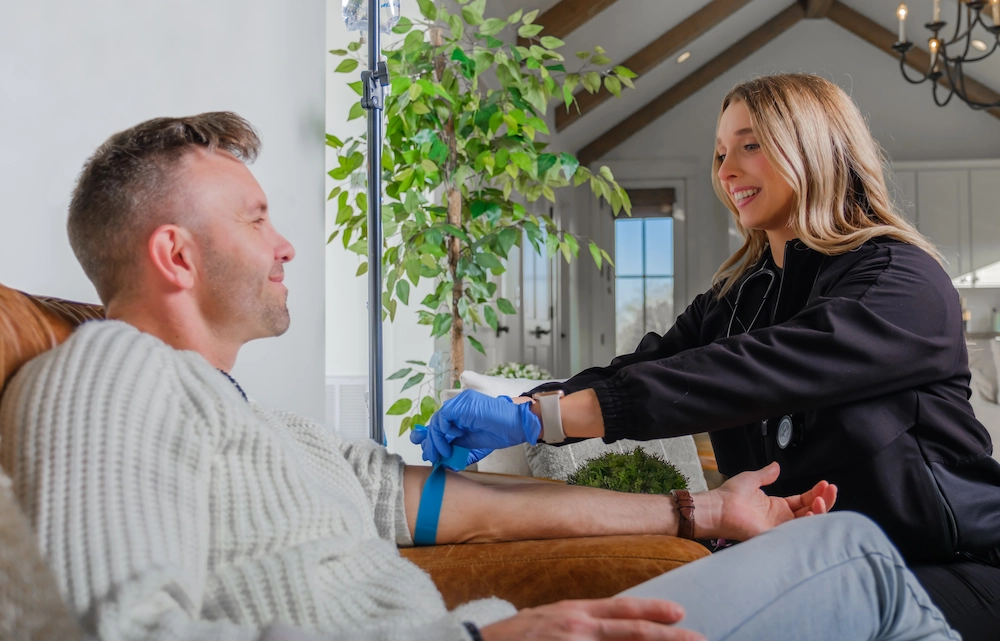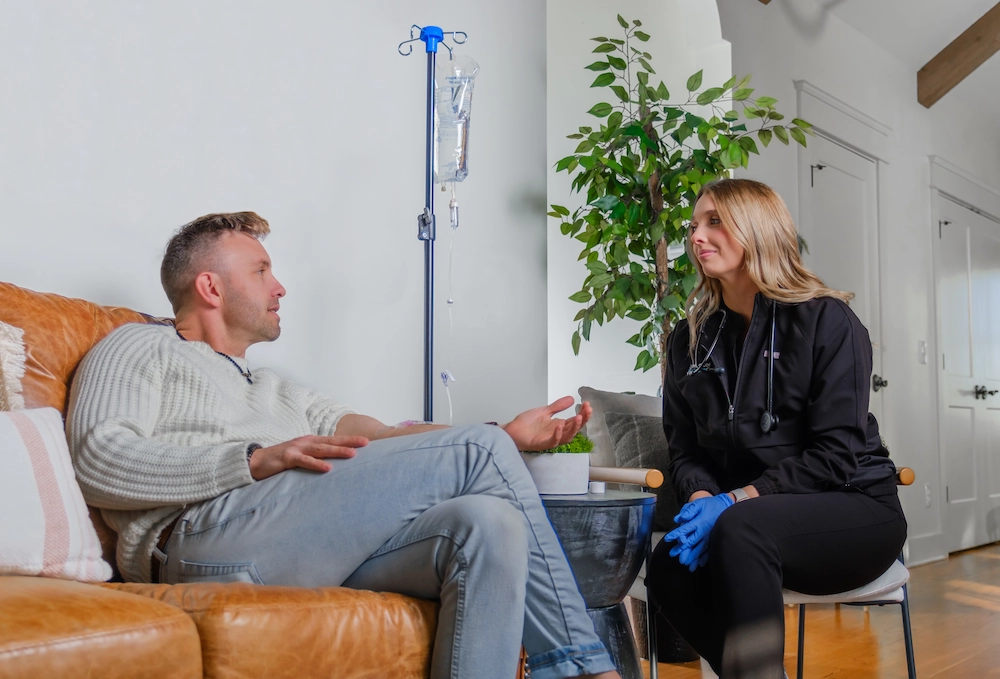Unlock Vitality with NAD+ Therapy

Table of Contents
Unveiling the Transformative Potential of NAD+ IV Therapy
Nicotinamide Adenine Dinucleotide (NAD+) has emerged as a pivotal player in cellular function, and its intravenous administration has garnered attention for its potential to revitalize the body. This article reflects on the groundbreaking strides made in the realm of health and wellness by delving into the science behind NAD+ IV Therapy, its applications, and its transformative impact.
What Is NAD+ IV Therapy?
NAD+ is a coenzyme found in every cell of the body, playing a crucial role in various biological processes, including energy production, DNA repair, and cellular communication. As we mature, NAD+ levels decline, contributing to age-related conditions and diminished cellular function.
The Science of NAD+
NAD+ IV Therapy involves the intravenous infusion of NAD+ into the bloodstream. This method ensures rapid absorption and immediate availability to cells throughout the body. By replenishing NAD+ levels, the therapy aims to enhance cellular function, optimize energy metabolism, and support well-being.
Applications of NAD+ IV Therapy
Anti-Aging and Cellular Repair:
NAD+ is instrumental in repairing damaged DNA and promoting cellular regeneration. NAD+ IV Therapy has shown promise in mitigating the effects of aging, promoting skin health, and supporting the body’s natural repair mechanisms.
Neurological Health:
Research suggests that NAD+ plays a crucial role in maintaining cognitive function. NAD+ IV Therapy has been explored as a potential intervention for neurodegenerative conditions such as Alzheimer’s and Parkinson’s disease, showing promise in preclinical studies.
Energy and Performance Enhancement:
NAD+ is essential in producing ATP, the body’s primary energy currency. Athletes and individuals seeking enhanced physical performance have turned to NAD+ IV Therapy to optimize energy levels and improve endurance.
Addiction Recovery:
Preliminary studies indicate that NAD+ IV Therapy may aid in addiction recovery by mitigating withdrawal symptoms and supporting the restoration of neurotransmitter balance. It is being explored as a complementary approach in substance abuse treatment.
How NAD+ IV Therapy Works
NAD+ IV Therapy Process and Administration
The process begins with a medical assessment to ensure suitability. Once determined, a healthcare professional administers the NAD+ solution through an IV line, allowing for a controlled infusion into the bloodstream. The duration can vary; patients may undergo multiple sessions depending on their needs and health goals.
Some individuals seek NAD+ IV therapy to enhance energy levels, cognitive function, and vitality. While research on the efficacy is ongoing, some proponents suggest that it may have neuroprotective and anti-aging effects, though it’s essential to note that responses to the treatment may vary.
NAD+ IV Therapy vs. Other Forms of Supplementation
While oral NAD+ supplements are available, they face challenges in terms of absorption and bioavailability, as the digestive system can break them down before they reach the cells. In contrast, NAD+ IV therapy involves the infusion into the bloodstream, allowing efficient delivery to cells throughout the body. This approach bypasses the digestive system, leading to higher concentrations of NAD+ reaching target tissues.
The faster and more direct absorption associated with NAD+ IV therapy is often cited as an advantage, particularly for individuals seeking instant effects or facing conditions that may compromise oral absorption. Alas, the choice depends on individual preferences, health conditions, and healthcare professionals’ guidance, as the scientific understanding of the comparative efficacy and long-term effects is still evolving.
Clinic-Based vs. At-Home IV Therapy
Clinic-based therapy occurs in a medical setting. Patients visit a clinic where trained staff administer the NAD+ infusion through an intravenous line. This approach ensures a controlled and monitored environment, allowing healthcare providers to adjust the infusion rate and respond to adverse reactions.
In contrast, at-home NAD+ IV therapy involves patients self-administering the infusion in the comfort of their homes. This offers convenience and flexibility without the need for frequent clinic visits. However, it comes with increased responsibility for the patients to follow procedures, maintain sterile conditions, and monitor for side effects.
The choice between clinic-based and at-home NAD+ IV therapy depends on preferences, medical considerations, and the ability to adhere to safety guidelines. It is crucial for individuals opting for at-home treatment to receive guidance from healthcare professionals to ensure a safe and effective process.

Safety and Risks of NAD+
As NAD+ IV Therapy gained popularity, numerous individuals reported transformative effects, citing increased energy levels, improved cognitive function, and well-being. Nonetheless, while anecdotal evidence is promising, more rigorous scientific research is needed to establish the therapy’s efficacy across various applications.
Challenges and Considerations
Despite its benefits, NAD+ IV Therapy is not without challenges. Questions regarding optimal dosages, long-term safety, and standardization of protocols persist. Furthermore, the therapy’s accessibility and affordability remain concerns that warrant attention as its popularity grows.
Potential Side Effects
Common side effects may include temporary sensations of warmth or flushing during the infusion process. Some individuals may experience nausea, headache, or dizziness, which subsides once the infusion is complete. However, in rare cases, more severe side effects can occur, such as allergic reactions, which may manifest as difficulty breathing, chest tightness, or swelling of the face and throat.
As with all medical interventions, responses vary, and the risk of adverse effects may be influenced by factors such as health, pre-existing medical conditions, and the dosage.
Choosing a Qualified Provider for NAD+ IV Therapy
Seek out licensed healthcare professionals, such as medical doctors, registered nurses, or other certified practitioners, who have received training in administering intravenous therapies. Reputable providers should conduct thorough medical assessments before initiating NAD+ IV therapy to identify contraindications or underlying health issues. Practitioners should also adhere to safety protocols, including maintaining sterile conditions during infusion.
Patients should inquire about the provider’s experience, request references or reviews from previous patients, and verify the clinic’s credentials and compliance with relevant healthcare regulations. Transparent communication is essential, and qualified providers should be willing to discuss potential risks, benefits, and alternative treatments, fostering a dialogue to address concerns or questions.
FAQs
What Should I Expect During NAD+ IV Treatment?
During treatment, individuals can expect a process to replenish Nicotinamide Adenine Dinucleotide (NAD+) levels. Once suitability is determined, a healthcare professional will administer the solution through an intravenous (IV) line. The infusion takes place in a comfortable setting, whether at a clinic, medical office, or sometimes even in the convenience of one’s home, under supervision.
How Much Does NAD+ Treatment Cost?
The cost is based on factors such as location, the provider’s qualifications, and the specific treatment plan offered. Individuals considering NAD+ therapy should inquire about the pricing structure and associated fees. At Medical House Calls in Tennessee, their pricing can be found at https://medicalhousecalls.com/iv-therapy/.
While costs may differ, potential patients can use that as a reference point to understand the financial aspects associated with NAD+ IV therapy. It’s advisable to review what each package includes and inquire about additional charges that may apply. Some providers may offer bundled packages or discounts for multiple sessions. The aforementioned Medical House Calls, for example, offer a special where after 5 IV purchases, the 6th one is free.
When evaluating the cost of NAD+ treatment, individuals should consider not only the financial investment but also the provider’s qualifications, the quality of service, and the potential benefits associated with the therapy.
How to Schedule a Medical House Calls IV Therapy Appointment
NAD+ IV therapy’s potential to impact aging, neurological health, energy levels, and addiction recovery underscores its significance in the evolving landscape of holistic wellness. With ongoing research and a commitment to addressing challenges, NAD+ IV Therapy holds promise as a valuable tool in optimizing cellular function and promoting vitality. As the journey continues, the coming years may unveil even more profound insights into the potential of this innovative approach to well-being.
Medical House Calls features an extensive IV Therapy menu including all the vitamins, electrolytes, antioxidants, and NAD+. We provide all the supplies, whether you need IV therapy at home or in the office. To book a same-day or next-day appointment, text or call us at (615) 838-2375 today.












